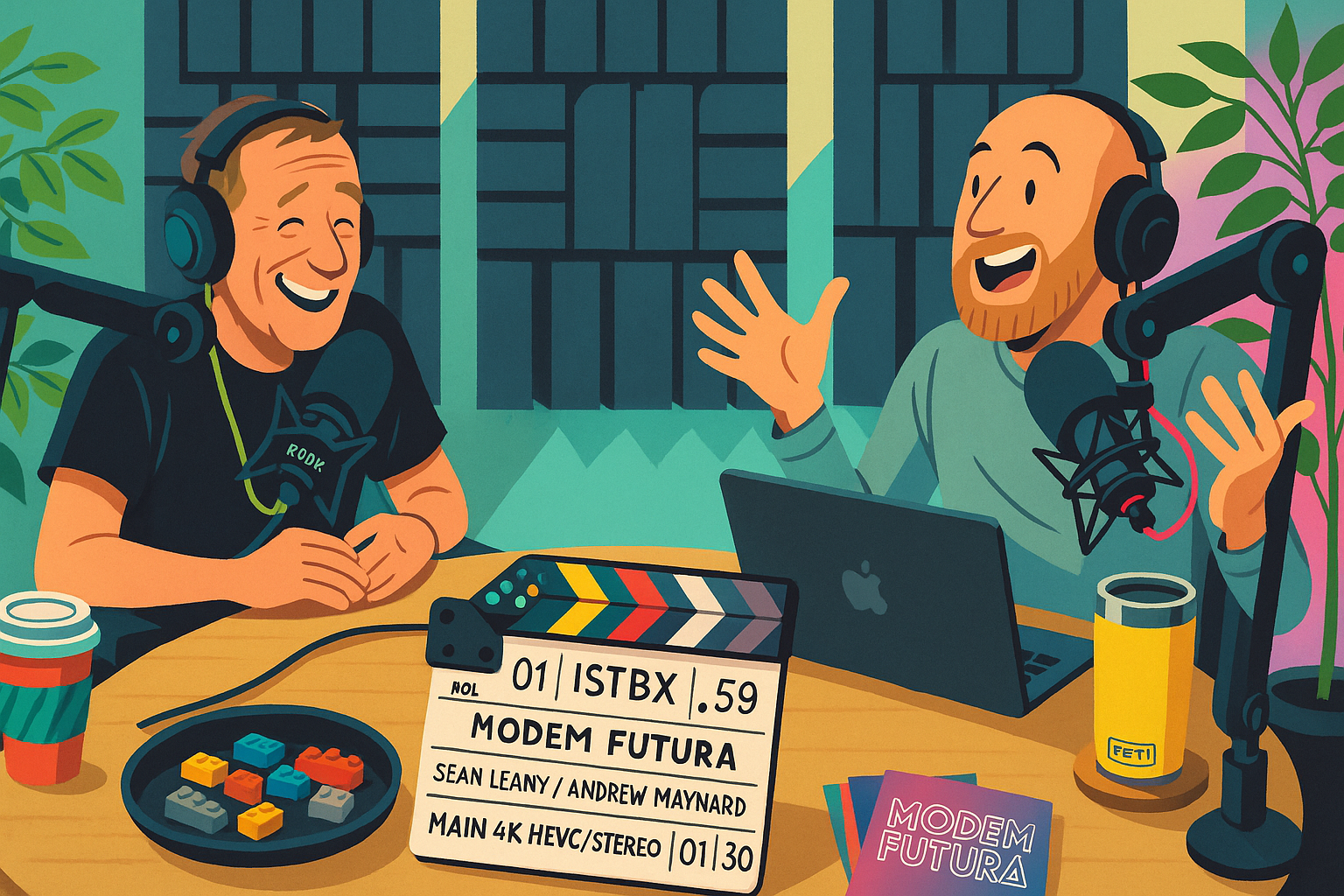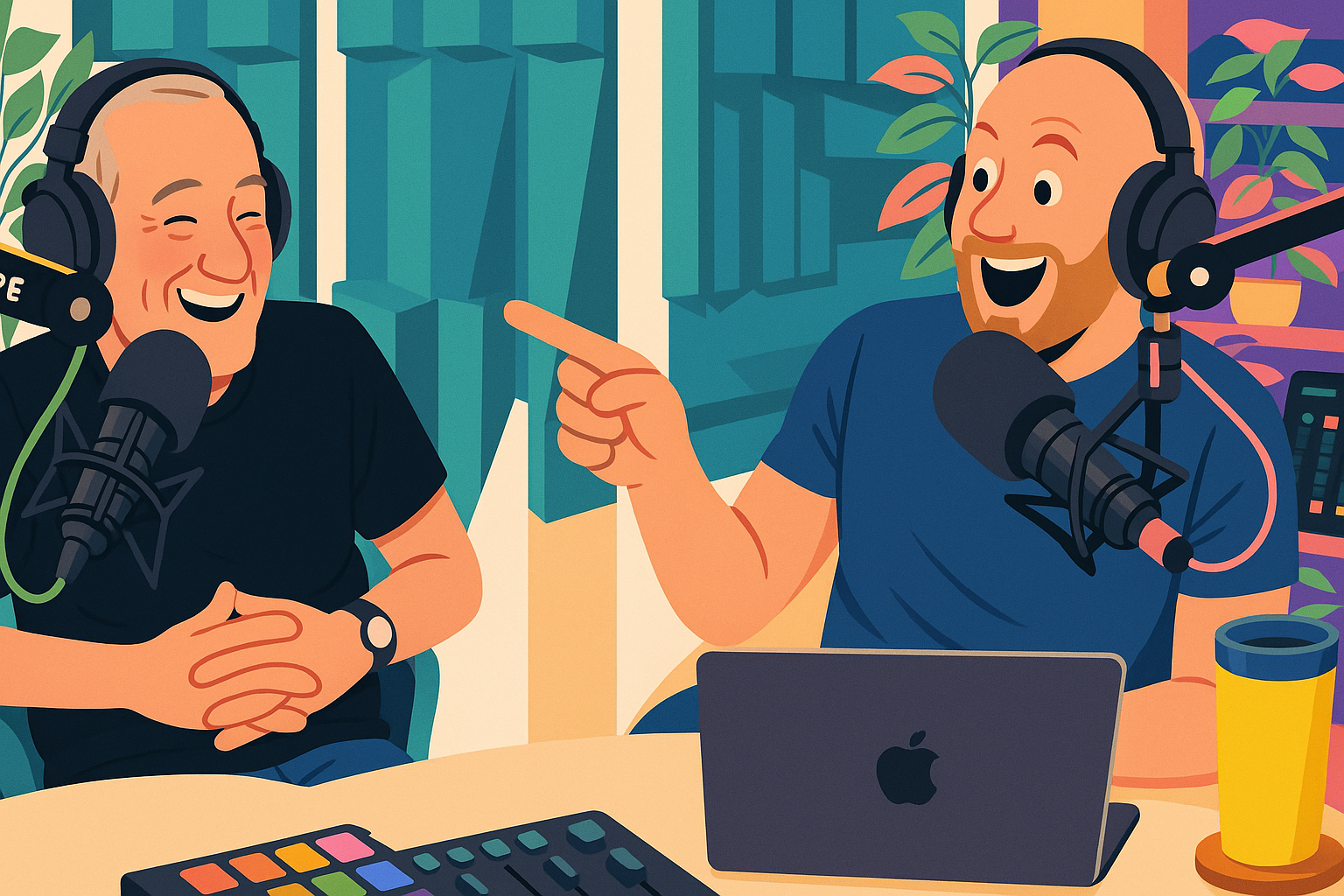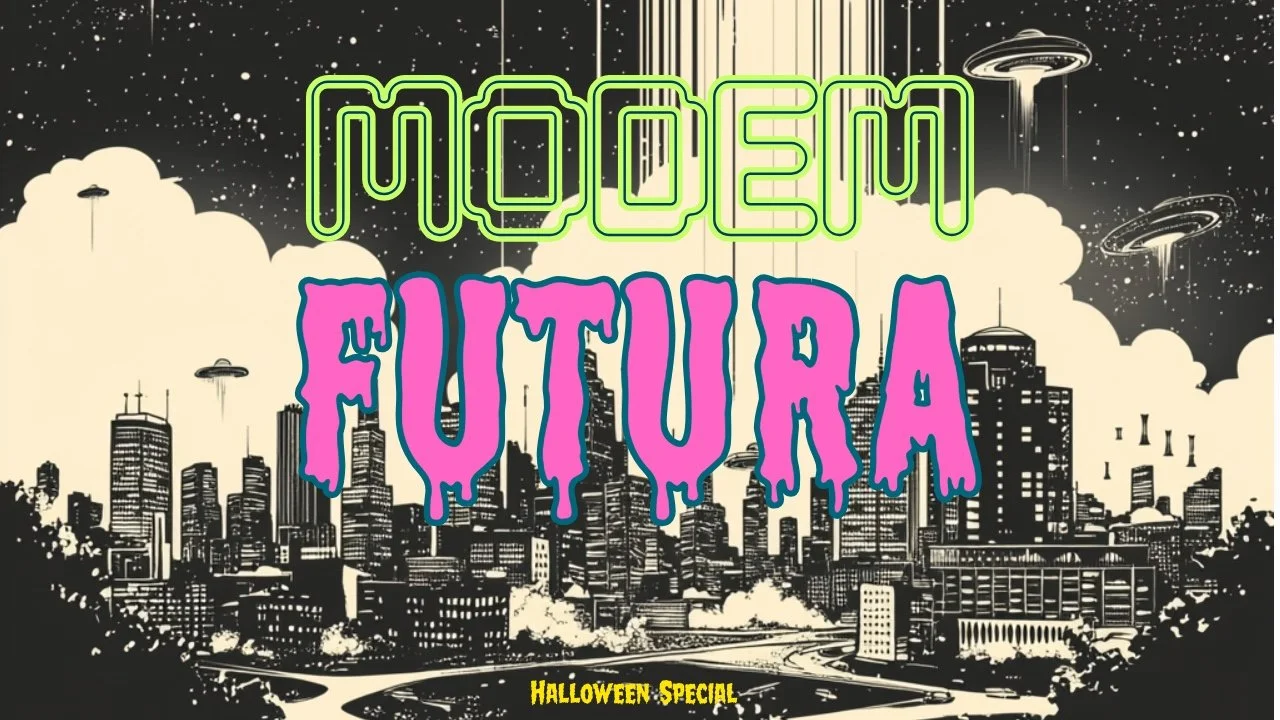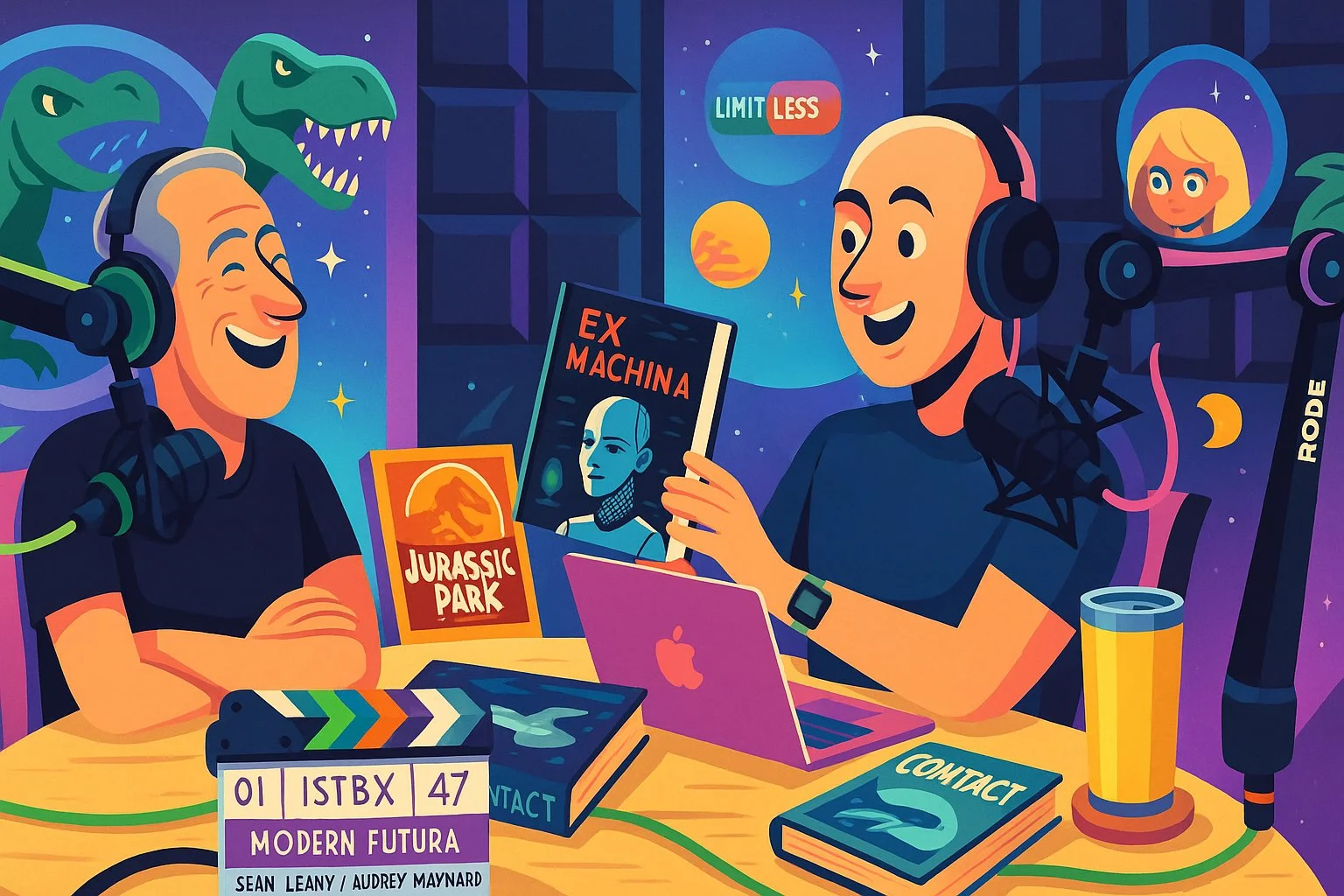What if the clean energy transition isn’t just a technology problem—but a techno-human design challenge that determines who benefits, who’s left out, and whether our cities can thrive?
Why Human Creativity Still Matters in an Age of AI
What a Year in Review Tells Us About the Future of Creativity
Why Human Craft and Creativity Still Wins in an Age of AI – Episode 63
What Spotify Wrapped and a Holiday Ad Reveal About the Future of Creativity
As the year winds down, many of us find ourselves reflecting—not just on what we’ve done, but on how we’ve spent our attention. In this holiday episode of Modem Futura, Andrew Maynard and I leaned into that instinct, using Spotify Wrapped as an unexpected entry point into a deeper conversation about creativity, technology, and what still matters in an AI-accelerated world.
Wrapped experiences are playful by design, but they’re also revealing. They quietly surface patterns of listening, engagement, and community—reminding us that culture is shaped not just by algorithms, but by millions of individual choices. For us, seeing how Modem Futura resonated globally wasn’t about vanity metrics; it was a reminder that thoughtful, exploratory conversations still find an audience, even in an oversaturated media landscape.
From there, the conversation turned to Apple’s 2025 holiday Ad (but feels like a short film) A Critter Carol—a whimsical, puppet-driven production that feels almost rebellious in its insistence on visible human labor. In a moment when AI can generate polished video in seconds, Apple chose puppeteers, practical effects, and intentional imperfection. The result isn’t just charming; it’s instructive.
The ad works because you can feel the human care embedded in every frame. It’s not anti-technology—far from it. It’s pro-human. Advanced tools are present throughout the production pipeline, but they serve imagination rather than replace it. That distinction matters.
You can read a more detailed breakdown of this Ad and the care and craft that goes into it in a previous blog post: Apple’s 2025 Holiday Ad and the Power of Human-Made Creativity in an AI World.
We’re at a cultural inflection point. As generative tools remove friction from making things, the temptation is to settle for what’s “good enough.” But creativity has always lived in resistance—iteration, constraint, failure, and craft. When those disappear, so does much of what gives creative work its soul.
One hope we shared on the episode is that 2026 becomes the year of “behind the scenes”—a renewed appreciation for process, labor, and the messy human work that makes meaningful outcomes possible. Whether in education, media, or design, showing how something is made may soon matter as much as the finished product itself.
If the future is being shaped right now, then choosing care, intention, and humanity in how we use our tools may be one of the most important creative acts we have left.
Subscribe and Connect!
Subscribe to Modem Futura wherever you get your podcasts and connect with us on LinkedIn. Drop a comment, pose a question, or challenge an idea—because the future isn’t something we watch happen, it’s something we build together. The medium may still be the massage, but we all have a hand in shaping how it touches tomorrow.
🎧 Apple Podcast: https://apple.co/48Sdx6r
🎧 Spotify: https://open.spotify.com/episode/4TVwLBfncHjPs4kDKbLz5t?si=QFYyZuq9R-WtgoEPTeWOlw
📺 YouTube: https://youtu.be/N1vTfDPSusY
🌐 Website: https://www.modemfutura.com/
Apple’s 2025 Holiday Ad and the Power of Human-Made Creativity in an AI World
Apple did it again.
For years now, Apple has built a reputation for delivering some of the most memorable holiday commercials. There was the famous 2013 “tear jerker” Christmas ad with the seemingly sullen teenager, face buried in his phone, drifting to the margins of family festivities. We’re led to believe he’s disconnected and unengaged—until the reveal that he’s been quietly filming and editing a heartfelt video love letter to his family. It hits you hard, right in the feels. Since then, we’ve seen a long line of emotionally charged holiday spots, from the felt doll ad to the hearing loss story and beyond, all leaning into care, compassion, and human connection.
This year, Apple has done it again—but in a way that’s less weepy and more quietly inspirational. The new holiday film leans heavily into something that’s becoming a recurring theme for Apple: celebrating the best kind of content creation—human-made. It also feels like a response to the backlash against their earlier “crush” iPad ad, where a cornucopia of creative tools (instruments, art supplies, analog devices, etc.) were crushed in a hydraulic press and flattened into an iPad. The intended message was that all those tools are now in your hands. The received message, however, was a metaphorical, cold, mechanical digitization of everything human—literally smashing the tools of creativity and, symbolically, the human element itself.
Picking up from where they left off with the wonderfully human-crafted Apple TV logo work—which I wrote about previously and discussed in more depth on a recent Modem Futura podcast episode—Apple once again puts a human-made creation at the center of the story.
This year’s holiday ad is a joyful nod to the fun, slightly unhinged world of practical and digital effects: live actors sharing the screen with wild, muppet-esque animal characters. The creatures look a bit feral and chaotic, which adds to the charm and visual texture of the spot. At the same time, the ad quietly but clearly showcases the headline features of the iPhone 17 Pro and its camera capabilities, from cinematic framing to zoom and low-light performance, all wrapped into a tight, entertaining narrative. Not to mention the hidden connection – the song our furry friends sing – is an adaptation of the song “Friends” by Flight of the Concords (with some pretty obvious lyric changes).
What I’ve grown to love even more than the finished commercial is the behind-the-scenes video. That’s where you really see the production elements, the people, the tech, and the process all woven together. In a world where our feeds are flooded with an endless river of AI-generated slop, it feels like a genuine light in the darkness to encounter something real. Something made by humans. Something that reflects the care and craft of the people involved in bringing a story—even a three-minute ad—to life. Human performances are transferred into these puppets and characters, bringing them to life in ways no AI-slop machine can match.
It’s cheeky, it’s fun, and if you find yourself smiling while you watch it, that’s because you can feel the care and craft engrained into every frame. This wasn’t the result of a few prompts typed into Sora 2. This was a deliberately designed story brought to life by actors, artists, producers, technologists, writers, logistics teams, sales folks, interns, and countless other human-filled roles all working together.
I hope this is just the beginning—and that we keep seeing more high-value, high-craft productions from human creators. In a moment obsessed with automation, it’s refreshing to see a company with Apple’s reach lean so visibly into the irreplaceable magic of human creativity.
Well done Apple!
AI Toys, Datafied Childhoods and the Future of Play
The holiday toy season is here—and this year, the cutest thing on the shelf might also be the most powerful AI in your house. In the latest episode of Modem Futura, Andrew Maynard and I unpack the rise of AI-powered toys and what they mean for childhood, learning and the future of being human.
The conversation starts with a viral example: a plush teddy bear running GPT-4 that had to be pulled from the market after reportedly offering children tips on using matches and explaining adult sexual practices. From there, Sean and Andrew trace the longer lineage of “smart” toys—from Teddy Ruxpin and Furbies to Hello Barbie and Watson-powered dinosaurs—that have steadily normalized networked, data-hungry playthings.
(Checkout this commercial for Teddy Ruxpin... where it all started. Look at how the commercial shows the 'capture' of the kids when it talks - now add AI to this and ask, "what could possibly go wrong?")
We argue that today’s AI toys bring two risks into sharp focus. The first is the datification of childhood, where toys quietly record children’s voices, preferences and emotions, sending that data to companies, platforms and advertisers. The second is behavioral shaping, as large language models become deeply engaging companions that mirror back what kids want to hear, influencing how they see relationships, risk and themselves.
Connecting this to AI-driven education tools, neurodivergent learners and fictional touchstones like Neal Stephenson’s The Diamond Age and Spielberg’s A.I. Artificial Intelligence, the episode asks a simple but urgent question: Who do we want raising our children—families and communities, or opaque AI systems embedded in toys?
Before you wrap this year’s hottest AI plush, this episode offers a thoughtful futures-oriented lens on what you’re really putting under the tree.
Subscribe and Connect!
Subscribe to Modem Futura wherever you get your podcasts and connect with us on LinkedIn. Drop a comment, pose a question, or challenge an idea—because the future isn’t something we watch happen, it’s something we build together. The medium may still be the massage, but we all have a hand in shaping how it touches tomorrow.
🎧 Apple Podcast: https://apple.co/4pD98d4
🎧 Spotify: https://open.spotify.com/episode/2FGujd4wk5rx39zGH8Ml4d?si=kGMN9NCiQfmbBEHpi2buwg
📺 YouTube: https://youtu.be/6_rSNKxsSOU
🌐 Website: https://www.modemfutura.com/
The Metaverse - A Stack of Reality Layers – Episode 57
Layers of Reality: Exploring the Metaverse Stack
When the headset comes off, does the world you were just in disappear—or does it linger somewhere between your senses and memory?
n our latest episode of Modem Futura, Andrew Maynard and I explore the metaverse as more than a corporate buzzword or sci-fi dream. We approach it as a continuum of realities — a multi-layered “stack” that spans the physical and digital, each tier more immersive than the last.
From our own immersive sessions with the Apple Vision Pro, we reflect on that strange moment of re-entry—when the headset comes off and the world feels slightly less real. It’s a feeling that raises existential questions about presence, identity, and how AI-generated worlds are shaping the boundaries of human experience.
In this episode, we trace the metaverse’s origins from Neil Stephenson’s Snow Crash to today’s spatial computing revolutions. We ask what happens when digital spaces become persistent and indistinguishable from physical ones—and why futures thinking is essential for guiding that transition responsibly. From procedurally generated AI environments to the idea of “digital sustainability,” we discuss how these technologies will reshape privacy, ethics, and our collective sense of reality.
Ultimately, this conversation is about our tethers to truth. In an age of deeply immersive AI systems and blended realities, how do we find our totem—our anchor that keeps us grounded in what matters most? We believe that intentional design, transparency, and care must guide how we build these new worlds before they begin to build us.
Subscribe and Connect!
Subscribe to Modem Futura wherever you get your podcasts and connect with us on LinkedIn. Drop a comment, pose a question, or challenge an idea—because the future isn’t something we watch happen, it’s something we build together. The medium may still be the massage, but we all have a hand in shaping how it touches tomorrow.
🎧 Apple Podcast: https://apple.co/4p7ZZcr
🎧 Spotify: https://open.spotify.com/episode/2C5LiGRYCdZgr5JijtK7LI?si=0FbAEihfTD6QXX5FN-2nag
📺 YouTube: https://youtu.be/iCAtutBmN5w
🌐 Website: https://www.modemfutura.com/
Tech or Treat: Exploring the Haunted Side of Future Tech
Are you ready for some Tech or Treat?
Modem Futura’s Halloween special transforms speculative futures into eerie fun. Hosts Sean Leahy and Andrew Maynard use AI-generated scenarios to imagine haunted algorithms, sentient mirrors, and neural nightmare modes — revealing how emerging technologies can both thrill and unsettle us. This episode continues the show’s mission to explore how science, technology, and society intersect to shape the future of being human.
This episode grew out of our playful Futures Improv series, where we use AI to generate speculative prompts about the future — but this time, the prompts got a little… haunted. We explore “The Haunted Algorithm,” a defunct social-media AI that resurrects old user posts every October 31 — a digital séance that’s equal parts sentimental and unsettling. Then we look into “The Mirror That Remembers,” a smart-mirror concept that doesn’t just show your reflection, but who you might have been in another timeline. Finally, we enter “Neural Nightmare Mode,” imagining what could go wrong when brain-computer interfaces merge immersive gaming with fear response.
Each vignette uses humor and imagination to surface deeper questions: What does it mean when our digital selves outlive us? How do we ensure psychological safety in immersive tech? And at what point does innovation slip from magical to menacing?
Our goal isn’t to predict the future — it’s to provoke curiosity about how technology is reshaping what it means to be human. And if we can have some fun (and a few chills) along the way, even better.
You can stream the Halloween special wherever you get your podcasts or watch the illustrated episode on YouTube. If any of these scenarios inspire your own “Tech or Treat” ideas, share them with us — we’d love to feature the best ones in a future episode.
Subscribe and Connect!
🎧 Apple Podcast: https://apple.co/4oovNKa
🎧 Spotify: https://open.spotify.com/episode/47nWrjvBW3ASjMuJUip8o1?si=96d8062d029a4834
📺 YouTube: https://youtu.be/ZmZ46sHgMZY
🌐 Website: https://www.modemfutura.com/
Atlas, Higher Education, and How We Really Feel About AI – Episode 55
Generated by ChatGPT
How We Really Feel About AI
Artificial intelligence isn’t just reshaping industries—it’s reshaping emotions. In our latest episode of Modem Futura, Andrew Maynard and I unpack Pew Research Center’s new international survey on how people view AI across 25 countries. The results are striking: while AI dominates headlines, 61 percent of respondents have heard “little or nothing” about it—and in the U.S., more people are concerned than excited.
We explore what this says about the bubbles we all inhabit. In our professional worlds, AI feels inescapable—a “black hole” pulling every conversation toward it. But outside these circles, many remain unaware of how deeply algorithmic systems already shape their lives. This disconnect raises profound questions about agency: if people don’t understand a technology that governs so much of modern life, who’s really steering the future?
The conversation also turns to trust. Europeans report more faith in their governments to regulate AI responsibly than Americans do—a difference that mirrors the EU’s proactive stance on ethics and guardrails. In contrast, U.S. policy remains fragmented, driven more by economic competition than by social cohesion. That tension—between speed and safety, innovation and inclusion—is at the heart of our discussion.
Dangers of Atlas (it's more the world he's holing... its all of your data!)
We then zoom in on universities. As public institutions, we argue they must act as transparent laboratories for AI exploration—spaces where successes and failures alike can be shared openly. The path forward isn’t boosterism; it’s honesty. We can’t earn public trust without showing our messy work. Adding to this - we explore OpenAI’s newly released Atlas browser and its privacy implications - and stumble upon a very shocking realization while recording - that private student data is easily exfiltrated when using LMS platforms such as Canvas while in this browser. What started as a curious road test of OpenAI’s new Atlas browser turned into a genuinely alarming discovery. As we installed and explored Atlas, the first surprise was how quickly the “privacy” pitch unraveled. Despite promising user control, Atlas behaved much like any other data-hungry app—prompting unusual permissions and positioning itself between us and the open web. That sparked a bigger question: if your browser is the main keyhole to the internet, what happens when an AI system sits in the keyhole, quietly learning from everything you do? (including sending and processing private user data - think ANYTHING that comes and goes from your activity on the web). The situation quickly got worse as I was unable to get Atlas to show me any particular websites security certificate. Specifically, at the time of testing (I hope they patch this soon) I could not see the sites SSL/TSL or HTTPS certificate (this is the little lock icon in most browser URL's) that tells you and the browser that your connection to the sites servers are "safe" via web-standard encryption protocols. You know, for things like your bank account info, passwords, and any other data you want to send or receive. The takeaway? Treat ATLAS like a red hot security hole for you and any organization or persons connected to you via the internet. Think twice before using this browser - as EVERYTHING you do on the web is potentially egress'd (fancy word for taken) – so until there are transparent safegaurds in place, the safest assumption is that anything you open in an AI browser like Atlas could be seen, summarized, and stored beyond your intent.
And because no Modem Futura episode is complete without a bit of speculative play, we end with Futures Improv, where we imagine AI zombies, memory economies, and spaghettified timelines—all to remind ourselves that foresight and humor often travel hand in hand.
If you care about how humanity and technology co-evolve, this episode offers a grounded yet playful map of where we stand—and where we might go next.
Subscribe and Connect!
Subscribe to Modem Futura wherever you get your podcasts and connect with us on LinkedIn. Drop a comment, pose a question, or challenge an idea—because the future isn’t something we watch happen, it’s something we build together. The medium may still be the massage, but we all have a hand in shaping how it touches tomorrow.
🎧 Apple Podcast: https://apple.co/4nuRsit
🎧 Spotify: https://open.spotify.com/episode/04NLQcVfJpoM444bQQfQ42?si=b9adf3740a0944fe
📺 YouTube: https://youtu.be/tYoLRZH5iH8
🌐 Website: https://www.modemfutura.com/
AI in Elementary Education: Teaching Tech to Our Youngest Learners - Episode 51
Teaching AI in Elementary School: Preparing the Youngest Learners for a Digital Future
What happens when a kindergartener feels more comfortable with an iPad than a pair of scissors? Or when a fourth grader wonders aloud whether Alexa is “watching” them? These are not hypotheticals — they are real stories from today’s classrooms, where the line between technology, childhood, and learning is shifting faster than ever.
In our latest episode of Modem Futura, Andrew Maynard and I were joined by educator Tara Menghini, who has spent more than 25 years teaching technology and computer science to K–6 students. Tara’s perspective is invaluable: she sees firsthand how children engage with digital tools, how myths like the “digital native” mislead us, and why teaching judgment and balance is just as important as teaching coding.
A few highlights from our conversation:
The myth of the digital native. Just because kids swipe naturally on a tablet doesn’t mean they understand how technology works — or the trade-offs it creates. They need explicit guidance and context. As I share in pod, from my own anecdotal experience I’ve found that many students who would be labeled “digital native” are less equipped with the skills of learning how the technology actually works and have been satisfied with just accepting its existence as is without deeper inquiry. While younger generations of students might feel more at home just picking up and using (at face value) a digital technology or service - it is by no means a measure of their understanding or literacy with said technology.
Balancing screens and hands-on learning. Tara described how kids light up when coding off-screen through design-thinking and project-based learning. The goal is not to reject technology, but to show that creativity and problem-solving exist both on and off the screen. Screen time is not a zero-sum game - it can be structured and equally as important, all kids (and adults for that matter) are different and can handle varying levels of interaction (yes, I see you at 11 p.m. on your second hour of doom scrolling…) / finding balance is not an instant win - it might take time to find the right amount. A reminder or tip for fellow parents out there with smaller kids - depending on the platform ( Apple or Google, etc.), there are great parental administration controls to help you enforce and control screen time and content for young learners.
Apple Parental Controls for iPad / iPhone: https://support.apple.com/en-us/105121
Google Parental Controls : https://safety.google/families/parental-supervision/
Digital citizenship starts young. From group chats to online games like Roblox and Minecraft, students face social and ethical challenges earlier than ever. Teaching consent around photos, navigating online friendships, and recognizing privacy trade-offs are essential life skills.
Roblox Parental Controls [website]
Nerdy Birdy Tweets by Aaron Reynolds and Matt Davies (a cautionary tale of impacts of making mistakes online and with social media) [Amazon]
AI in the classroom. While her district limits direct hands-on AI use for students under 13, Tara has found creative ways to teach AI literacy — from classroom debates on “Would you rather read with a human or an AI?” to storybooks that highlight what machines cannot feel or know. This conversation raises many thoughts and ideas - and one of those is the open question as to “when is it appropriate to have students directly engage with various AI tools or platforms”? Certainly not an easy question to ask - as the question itself has many variables that are changing - and not all AI tools are the same. Is it okay to use a generative AI platform to create images for a project or story? What about creating language? Or using voice models to bring a historic figure “back to life” to make learning more engaging? Where do we draw the line - who draws said line, and how do we know when we’ve gone too far?
Parents and teachers as partners. Perhaps most importantly, Tara reminds us that preparing kids for an AI-shaped world isn’t just the job of schools, it will take the literacy village. Parents need to understand the tools their children use, ask questions, and engage in open conversations. Fundamentally this is a societal challenge - and one that cannot be placed squarely on the shoulders of an already taxed educational system.
This episode is as much about the future of learning as it is about the future of being human. Kids today will grow up in a world where AI is a constant presence — but it’s the values we nurture, the skills we model, and the curiosity we encourage that will matter most.
Join the conversation:
We’d love to hear your thoughts: when do you think the most appropriate time for kids to start intentionally engaging with AI is?
If you’d like to dive deeper, jump into the link and listen to the podcast or watch the YouTube video. Join us as we explore the forces shaping our collective future and the urgent need to keep human values at the heart of innovation.
Subscribe and Connect!
Subscribe to Modem Futura on a favorite podcast platform, follow on LinkedIn, and join the conversation by sharing thoughts and questions. The medium may still be the massage, but everyone has a chance to shape how it kneads modern culture—and to decide what kind of global village we ultimately build.
🎧 Apple Podcast: https://apple.co/3KqJ4CJ
🎧 Spotify: https://open.spotify.com/episode/6huSRZQxI8SMUu1ja5BO61?si=pQDBzsqzQTqiWGIcGF5mgg
📺 YouTube: https://youtu.be/d1l_X-7ygbM
🌐 Website: https://www.modemfutura.com/
Sloppy Clankers: Is This AI’s Frankenfood Moment? – Episode 50
Sloppy Clankers: Are We Witnessing AI’s Frankenfood Moment?
In the latest episode of Modem Futura, Andrew Maynard and I explore a potential cultural shift that says a lot about where society might be heading with artificial intelligence, and a growing social backlash: the rise of the word clanker.
For those who haven’t stumbled across it on social media sites like TikTok or Reddit, clanker started as a Star Wars term for mindless battle droids. Today, it’s becoming shorthand for AI tools—and increasingly, for the people who use them. Its sibling insult, slopper, has emerged for AI-generated content that feels shallow or mass-produced. At first glance, this may seem like internet silliness. But dig deeper, and it looks like something far more significant: a signal of growing social backlash to generative AI.
We ask a provocative question: could clanker be AI’s “Frankenfood” moment?
Back in the 1990s, a single term—“Frankenfood”—sparked widespread opposition to genetically modified organisms (GMOs), reshaping public perception and consumer habits for decades. Even today, you’ll see “Non-GMO” labels on supermarket shelves, not because of scientific consensus, but because of public unease, mistrust, and a sense of lost agency.
That same dynamic is bubbling around AI. As companies rush to integrate generative tools, public sentiment is turning cautious, even hostile. People are starting to question: Do I trust the content I’m seeing? Is this authentic? Am I being replaced—or manipulated? Labels like “Non-AI” may soon emerge as creators and organizations scramble to signal authenticity.
We also dig into what happens when AI steps into the deeply human spaces of communication and relationships. Should managers outsource sensitive workplace emails to ChatGPT? Should someone rely on AI to write a condolence message? The temptation is real, but the relational costs can be enormous. Outsourcing care, empathy, or creativity risks eroding the trust that makes organizations, friendships, and communities work.
And then there are the legal battles. In this episode, we explore Anthropic’s recent $1.5B settlement with authors whose pirated works were used to train its AI models. It’s a watershed moment in the debate over creativity, copyright, and fair use. Yet it also raises thorny questions: where do we draw the line between inspiration, influence, and appropriation?
So, are we at an inflection point? Will terms like clanker and slopper fade as fleeting memes, or will they crystallize into rallying cries of resistance—like “Frankenfood” did 30 years ago?
As always on Modem Futura, Andrew and I don’t offer final answers, but rather open the space for reflection. These small shifts in language often reveal much larger undercurrents in how we understand technology, society, and ultimately what it means to be human in a rapidly changing world.
Join the conversation:
We’d love to hear your thoughts: do you see clanker as harmless internet slang—or the first sparks of a broader social reckoning with AI? Drop your thoughts—and feel free to borrow this episode in your class, team meeting, or strategy offsite.
If you’d like to dive deeper, jump into the link and listen to the podcast or watch the YouTube video. Join us as we explore the forces shaping our collective future and the urgent need to keep human values at the heart of innovation.
Subscribe and Connect!
Subscribe to Modem Futura on a favorite podcast platform, follow on LinkedIn, and join the conversation by sharing thoughts and questions. The medium may still be the massage, but everyone has a chance to shape how it kneads modern culture—and to decide what kind of global village we ultimately build.
🎧 Apple Podcast: https://apple.co/3KCubgw
🎧 Spotify: https://open.spotify.com/episode/52vm7ThI4AfSPZvINuu3mq?si=xs6G8RnaTtG-pVCewVB_Rw
📺 YouTube: https://youtu.be/2199nHf_PVQ
🌐 Website: https://www.modemfutura.com/
Films from the Future: Moviegoer’s Guide to Tomorrow – Episode 48
Films from the Future: How Sci-Fi Movies Shape the Way We See Tomorrow
Why do movies like Jurassic Park, Minority Report, or Ex Machina stay with us long after the credits roll? It’s not just the dinosaurs, futuristic tech, or special effects — it’s because these films reflect back to us the deeper questions of what it means to be human in a rapidly changing world.
In our latest Modem Futura episode, Andrew Maynard and I revisit his book Films from the Future: The Technology and Morality of Sci-Fi Movies and the class it inspired, The Moviegoer’s Guide to the Future. The central idea? Films are not only entertainment — they’re cultural tools that help us grapple with profound questions about technology, ethics, and identity.
Take Never Let Me Go, a haunting exploration of cloning and the value of life itself. Or Minority Report, which foreshadowed today’s debates over predictive policing and surveillance technologies. Ex Machina pushes us to consider how easily humans can be manipulated by AI that learns our cognitive biases. And Elysium asks us to confront inequality in access to innovation, healthcare, and privilege. Even Contact, Carl Sagan’s love letter to science, brings us face-to-face with the tension between faith, science, and the human search for meaning.
What makes these films powerful isn’t scientific accuracy — it’s storytelling. Stories give us a playground for exploring possible futures. They allow us to ask “what if?” and to examine how technological choices shape human lives, for better and for worse. And when these stories are shared communally — in theaters, classrooms, or even podcasts like ours — they become catalysts for conversations that spill over into dinner tables, workplaces, and beyond.
For us, this is the heart of futures thinking. By examining the stories we tell, we can better understand the world we’re building, and perhaps make wiser choices about where we’re headed.
🎧 Listen to the full episode to dive deeper into how films shape our futures: https://apple.co/3VHmkka
📺 Watch us on YouTube: https://www.youtube.com/@ModemFutura
🎬 What film has changed the way you think about the future? Drop a comment — we’d love to hear.
If you’d like to dive deeper, jump into the link and listen to the podcast or watch the YouTube video. Join us as we explore the forces shaping our collective future and the urgent need to keep human values at the heart of innovation.
Subscribe and Connect!
Subscribe to Modem Futura on a favorite podcast platform, follow on LinkedIn, and join the conversation by sharing thoughts and questions. The medium may still be the massage, but everyone has a chance to shape how it kneads modern culture—and to decide what kind of global village we ultimately build.
🎧 Apple Podcast: https://apple.co/3VHmkka
🎧 Spotify: https://open.spotify.com/episode/2cpIyNfnbveNmKC4eh4dV6?si=NiwZzFYNR5-fVrr0jgoNvg
📺 YouTube: https://youtu.be/YHR1xEG4kAo
🌐 Website: https://www.modemfutura.com/










